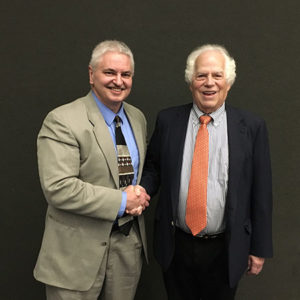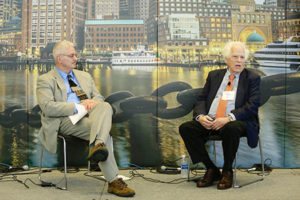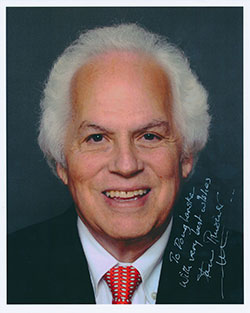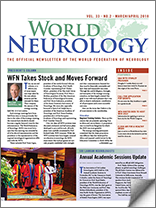By Douglas J. Lanska, MD, MS, MSPH, FAAN
In an oral history interview for the American Academy of Neurology conducted April 27, 2017, at the Boston Convention Center, I spoke with Nobel laureate Stanley B. Prusiner, the only living neurologist to have won a Nobel Prize (Lanska and Klaffke, 2017, Lanska, 2017).

Prusiner was the sole recipient of the Nobel Prize in Physiology or Medicine in 1997 “for his discovery of Prions — a new biological principle of infection.” Here is an excerpt from that interview concerning how Prusiner created the term prion, which he introduced in a landmark paper in Science in 1982 (Prusiner 1982).

Prusiner: [In the fall of 1980,] I was with a friend of mine who was a professor at Harvard. This was [American chemist] Frank Westheimer, PhD (1912-2007). [He was receiving] an honorary professorship in the pharmacy school. He came to see me and [we] talked. I went over everything I was doing. He said, “Stan, this is really fantastic. You’ve discovered something really new, and you need to give it a name, and you need to give it a good name. You need to think about this name for a long time. A lot of work needs to go into this. Because, if you give it a crappy name, someone else will come along and give it another name, and they will end up with the lion’s share of the credit, but you will have done the work, and that’s not a good idea. This is what you’ve done with your life, and you need to make sure that you don’t screw it up. So you need to spend a lot of time on this.”

Stanley Prusiner
Lanska: Could you to talk about how you came up with the term?
Prusiner: OK. I’m happy to recite this… [I]t’s the spring of 1981, and I need to finish this paper [Prusiner 1982]. The only thing holding it up is the word, and I’m trying to figure out a word.
So I go through Latin dictionaries, because I knew — I still know — a lot of Latin. I’m not a scholar in it; that’s for sure. I don’t know any Greek. I don’t really know how to come up with a word. I want a word like exon. I thought that’s a great word. Where do I find somebody who can do that? I kept thinking of somebody at Berkeley [who] can help me, but then I didn’t even know who to talk to. I thought this is going to be just frivolous to go to Berkeley and try to find some professor of words who will help me.
Then, I said, “OK, I’ve got to come up with some rational approach to a word, just taking a bunch of letters, and where are these letters going to come from? Well, they’re going to come from words that have something to do … [with the responsible agent].” So I wrote out [the words] protein, infectious, and agent. I started with that. I got piaf out of that, because I wanted protein, and I wanted infectious, and then I wanted agent.
Quark: What’s in a Name?
Prusiner is certainly not alone in devoting considerable energy to devising a catchy word for a newly described entity in science or medicine, and indeed he developed exemplars based on prior scientific neologisms. Later, in the public interview, Prusiner recalled:
My model words [for prion] were virus and quark [pronounced correctly as qwork]. I thought Murray Gell-Mann was terrific with that, stealing that from Lewis Carroll [sic]. So I looked through Alice in Wonderland for another one, but I didn’t find one. (Lanska, 2017)
American physicist Murray Gell-Mann (1929-) received the 1969 Nobel Prize in physics “for his contributions and discoveries concerning the classification of elementary particles and their interactions.”
Gell-Mann coined the term quark (which he pronounced kwork) in 1963 to refer to the fundamental constituents of the nucleon (i.e., either a proton or a neutron, considered in its role as a component of an atomic nucleus) (Gell-Mann, 1964, 1995). Despite Prusiner’s recollection to the contrary, the term quark did not originate in the fantasy novel Alice’s Adventures in Wonderland (1865), written by English mathematician Charles Lutwidge Dodgson (1832-1898) under the pseudonym Lewis Carroll. Instead, Gell-Mann derived the non-phonetic spelling from a whimsical poem in Finnegans Wake (1939) by Irish writer James Joyce (1882-1941).
According to Gell-Man’s account (1995): In 1963, when I assigned the name “quark” to the fundamental constituents of the nucleon, I had the sound first, without the spelling, which could have been “kwork.” Then, in one of my occasional perusals of Finnegans Wake, I came across the word “quark” in the phrase, “Three quarks for Muster Mark.” Since “quark” (meaning, for one thing, the cry of the gull) was clearly intended to rhyme with “Mark,” as well as “bark” and other such words, I had to find an excuse to pronounce it as “kwork.” But the book represents the dream of a publican named Humphrey Chimpden Earwicker. Words in the text are typically drawn from several sources at once, like the “portmanteau” words in Through the Looking-Glass [and What Alice Found There (1871), the novel by Lewis Carroll]. From time to time, phrases occur in the book that are partially determined by calls for drinks at the bar. I argued, therefore, that perhaps one of the multiple sources of the cry, “Three quarks for Muster Mark” might be “Three quarts for Mister Mark,” in which case the pronunciation “kwork” would not be totally unjustified. In any case, the number three fitted perfectly the way quarks occur in nature. (Gell-Man, 1995, p. 180)
Joyce’s line struck Gell-Mann as particularly appropriate, because the hypothetical elementary particles combined in groups of three to form baryons, such as protons and neutrons.
Gell-Mann adopted Joyce’s spelling for his “quork,” even though Joyce clearly intended quark to rhyme with Mark.
An equivalent model to Gell-Mann’s quark model was independently proposed by Russian-American physicist George Zweig (1937-) in 1964 (Zweig 1964a,b), the same year as Gell-Mann’s model, but Zweig did not propose a similarly catchy term and ultimately Zweig did not share the 1969 Nobel Prize in Physics.
Both Prusiner and Gell-Mann described or proposed new entities that warranted new scientific nomenclature. Both saw the new names as important factors in establishing and cementing their ideas in the “scientific marketplace” (anonymous 2012), and consequently both devoted considerable time and energy to the effort of inventing a term that was short, catchy, and in some way clearly novel, but that still could be justified in a plausible way (Gell-Mann 1995; Prusiner, 2014; Lanska and Klaffke 2017; Lanska 2017). To emphasize the novelty of their terms, both chose idiosyncratic non-phonetic pronunciations and repeatedly emphasized the “correct” pronunciation in subsequent discourse.
If Prusiner’s and Gell-Mann’s later experiences are any guide, Westheimer’s advice to Prusiner was certainly prescient: The names of newly described scientific entities do matter in establishing and maintaining scientific turf. Although Lewis Carroll’s Alice character was not the source of either neologism, she might still have had something to say about this if she had been consulted: “Curiouser and curiouser!” •
Lanska: You just kind of threw on an extra “f” for fun?
Prusiner: For infectious.
Lanska: Protein, infectious, agent…p-i-a. You added an “f.”
Prusiner: So you just underline the “f” in infectious, right? That’s where the letters all come from.
I always liked [French cabaret singer and songwriter] Édith Piaf [1915-1963; nee Édith Giovanna Gassion; she adopted her stage name, Piaf, from her nickname, which is French slang for sparrow]. Now, “sparrow” is announcing all of this, right? [Prusiner laughs.]
I then sent it to a friend of mine named Sidney Udenfriend (1918-2001), an American biochemist and pharmacologist who was running the Roche Institute in Molecular Biology. This was a fabulous place that was created by Roche to do basic science that would create drugs. Eventually, they shut it all down, because they never got one drug out of spending hundreds of millions of dollars over 20 years. He reads the paper, and he says, “Stan, this is an American discovery, not a French discovery. You don’t need a French word. You need another word. Go find another word.” So that was the end of piaf.
Short. You need something short. You need to have two vowels. Great words are words like virus. That’s a fabulous word. And quark [pronounced kwork] is a great word. Those are words that I think are just A+.
So I then throw out agent, because I don’t need agent. That’s totally non-specific, and I’m left with protein and infectious. Whenever I would go to a lecture, I would write out infectious across the top and protein on the side, or vice versa. Then, I’d just pick letters randomly. I didn’t get anywhere until one day. I’d probably stumbled across the same word 10 times and never picking it out: p-r-i-o-n. I read it, and I say, “This is prion.” I could have pronounced it pry-on, but I pronounced it pree-on. Then, I said, “I’m going to write p-r-e-e-o-n as the pronunciation in parentheses.”
I leave this defunct faculty club that was now a sandwich shop across the street, and I walk upstairs. I look in my Webster’s Unabridged Dictionary, because there are no computers. I find a bird with a sawtooth beak.
Lanska: A whalebird.
Prusiner: Right. And I said, “Well, you know, this really doesn’t matter. Lots of words have more than one meaning. There’ll be two pronunciations. If I’m right, this will be the No.1 definition, and the bird will continue to live on in oblivion, because no one is interested in prions [pry-ons]. I’ve never heard of a prion [pry-on]. It’s a petrel that lives in the south, the Southern Ocean [Antarctic Ocean].”
It’s not worth worrying about the bird. I said, “There’ll be a little crap from some of my competitors who will say, ‘That’s a bird.’” But I said, “It doesn’t matter.” So that’s where it came from. It had ion, so it looked like it was something highly basic. An ion really gets right down to the essence. And it was short. It had two syllables. It was going to be OK.
Lanska: You wrote in your book, though, that one of the reviewers of your paper objected, that the name had unfortunate echoes of the author’s name, Prusiner ions (Prusiner 2014, pp. 90-91).
Prusiner: Yes. That was pretty clever, [but] there was so much vitriol in the rest of the review.
Lanska: Now, of course, proteinaceous infectious gets you proin rather than prion…
Prusiner: Right, which is like loin.
Lanska: Which has kind of a funny sound to it, of course, no matter how you pronounce it. So you made another, little flexible change in that, just to give it a more catchy flavor, I think. Is that fair?
Prusiner: Yes. Proin is not a good word.
Lanska: But proteinaceous infectious as an acronym would get you that, right?
Prusiner: Yes.
Lanska: A lot of people didn’t like the term.
Prusiner: Yes.
Lanska: There was a lot of backlash. Why do you think there was so much animosity to that term?
Prusiner: If you read what other people have said, they didn’t like it, because essentially I took over the field by putting my imprimatur on the field prematurely, because I didn’t have enough information to come up with a word. That really is what I should have done was call it a Gibbs or a Gajdusek, [after NIH researchers C. Joseph Gibbs, PhD (1924-2001) and D. Carleton Gajdusek, MD (1923-2008), who first demonstrated the experimental transmission of kuru and Creutzfeldt-Jakob disease to chimpanzees in the period from 1966-1968 (Gajdusek et al, 1966, 1968; Gibbs et al 1967)] or a Gajdusek and a Gibbs, or a Gibbs and a Gajdusek, or something like that, or a Dickinson [after British veterinary geneticist and scrapie researcher Alan Dickinson, PhD (1930-2017)]. Of course, this was nonsense from my point of view.
I did exactly what Frank Westheimer told me to do. The result was exactly what Westheimer wanted to have happen, which was to get a good word and not have somebody else take over. They had a lot of time. I was the new guy on the block. But they never could figure out anything about what was truly going on. They didn’t have a way of doing something, or they weren’t clever enough, or they weren’t sufficient showmen to figure out where all of this was going to go. But Westheimer saw it and called it completely.
Lanska: I think they were stuck in one little framework.
Prusiner: Yes.
Lanska: And they struggled to keep fiddling with “unconventional virus” [or] “slow virus.”
Prusiner: They had their own words, that’s true, but they were really dumb. “Unconventional virus” is as dumb as it gets.
There’s that great quote that’s in [my memoir] from [scrapie researcher] Iain Pattison [of the British Agricultural Research Council’s Compton Research Institute], in which he says:
“The fourth decade of my association with scrapie ended in 1978, with the causal agent still obscure, and virologists as adamant as ever that theirs was the only worthwhile point of view. To explain findings that did not fit with a virus hypothesis, they rechristened the causal agent an ‘unconventional virus.’ Use of this ingenious cover-up made ‘virus’ meaningless — for is not a cottage an unconventional castle?” (Pattison, 1988) •
References:
- Anonymous. The scientific marketplace. Nature Materials 2012;11:259.
- Anonymous. What Does ‘Quark’ Have to Do with Finnegans Wake? How a word used by James Joyce became the name for an elementary particle of matter. Merriam-Webster, 2017. https://www.merriam-webster.com/words-at-play/quark [Accessed 12-12-17].
- Gajdusek DC, Gibbs CJ, Alpers M. Experimental transmission of a Kuru-like syndrome to chimpanzees. Nature. 1966;209(5025):794-796.
- Gajdusek DC, Gibbs CJ Jr, Alpers M. Transmission and passage of experimental “kuru” to chimpanzees. Science. 1967;155(3759):212-214.
- Gell-Mann M. A schematic model of baryons and mesons. Physics Letters. 1964;8(3):214-215.
- Gell-Mann M. The Quark and the Jaguar: Adventures in the Simple and the Complex. New York: Henry Holt and Co., 1995:180
- Gibbs CJ Jr, Gajdusek DC, Asher DM, Alpers MP, Beck E, Daniel PM, Matthews WB. Creutzfeldt-Jakob disease (spongiform encephalopathy): transmission to the chimpanzee. Science. 1968;161(3839):388-389.
- Lanska DJ, Klaffke L. Stanley Prusiner, MD, FAAN. American Academy of Neurology Oral History Archive Private Interview. 69th Annual meeting of the American Academy of Neurology, Boston, Massachusetts; April 27, 2017.
- Lanska DJ. Stanley Prusiner, MD, FAAN. American Academy of Neurology Oral History Archive Public Interview. 69th Annual meeting of the American Academy of Neurology, Boston, Massachusetts; April 27, 2017.
- Pattison IH. Fifty years with scrapie: a personal reminiscence. Vet Rec 1988;123:661-666.
- Prusiner SB. Novel proteinaceous infectious particles cause scrapie. Science 1982;216:136-144.
- Prusiner SB. Madness and Memory: The Discovery of Prions—A New Biological Principle of Disease. Yale University Press, 2014.
- Zweig G. An SU(3) model for strong interaction symmetry and its breaking. (CERN Report No.8182/TH.401. 1964a.
- Zweig G. An SU(3) model for strong interaction symmetry and its breaking: II. CERN Report No.8419/TH.412. 1964b.
Douglas S. Lanska is associate chief of staff for education at the VA Medical Center, in Tomah, Wisconsin. He is also professor of neurology at the University of Wisconsin School of Medicine and Public Health in Madison, Wisconsin, and professor of psychiatry at the Medical College of Wisconsin in Milwaukee, Wisconsion and the chair of the History and Archives Committee of the American Academy of Neurology.
